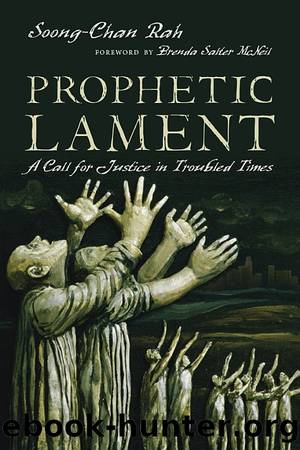Prophetic Lament: A Call for Justice in Troubled Times by Soong-Chan Rah

Author:Soong-Chan Rah [Rah, Soong-Chan]
Language: eng
Format: epub
ISBN: 9780830897612
Publisher: InterVarsity Press
Published: 2015-09-14T00:00:00+00:00
10
A GLIMMER OF HOPE
Lamentations 3:21-60
After vivid descriptions of misery and suffering for two chapters and the first part of Lamentations 3, a positive expression of hope is finally offered. Verse 21 offers the prophetâs hope: âYet this I call to mind / and therefore I have hope,â which could be paraphrased as: âI remember something that changed how I think, and now I have hope.â Verse 21 is the third of three lines that begin with the Hebrew letter zayin. While structurally tied to verses 19 and 20, verse 21 offers a seemingly abrupt change in the prophetâs perspective. By invoking the phrase âThis I call to mind,â the prophet engages in a different train of thought.
After sixty-four verses of expressing deep suffering, hope is finally offered. This hope does not rely on human achievement or triumphalism, but instead on Godâs grace. The shift in verse 21 arises from a calling to mind of the faithfulness of God to his covenant. These verses do not emphasize the human ability to turn around their own circumstances but instead focus on the character of God to bring about change. Hope is dependent on who God is rather than what we can do for ourselves.
In verse 22, Lamentations reminds us that God is faithful. The Hebrew word hesed is usually translated simply as âmercyâ or âcompassion.â In many cases, hesed should be understood as Godâs loyalty to his covenant. God does what he says he will do. In contrast to people, God does not act capriciously. In ministry, we are often hurt by people. Urban ministry is susceptible to those individuals who come and go from our outreach programs. They have great moments of spiritual renewal, only to return to sinful habits the next day. This capriciousness is not only symptomatic of urban churches but all churches, because human beings are fickle beings.
Godâs character is immutable. Hesed captures this essence. The justice that emerges from this covenant faithfulness is also immutable, which contrasts sharply with human fickleness. I am reminded of this reality as a parent. Based upon my actions as a parent, I would make a terrible judge since I can be very arbitrary. If my children donât walk the dog, they may be grounded for a month. Burning down the house might mean . . . no Xbox for a week. Maybe not to that extreme, but I am susceptible to a high level of inconsistency because I am human. My only consolation is that God does not operate under this same type of capriciousness in his judgment. Instead, he operates from loyalty to the covenant.
Godâs anger, therefore, is a temporary condition. His steadfast love and mercy persevere as primary characteristics. For God, covenant loyalty and fidelity are not based upon a feeling. Loyalty is ânot a passing phase in God, but an enduring part of his nature, always being renewed toward mankind.â1 Hesed arises from a sense of obligation and fidelity. God is obligated toward us. While Western concepts of
Download
This site does not store any files on its server. We only index and link to content provided by other sites. Please contact the content providers to delete copyright contents if any and email us, we'll remove relevant links or contents immediately.
| New Testament | Old Testament |
The Five People You Meet in Heaven by Mitch Albom(2861)
Name Book, The: Over 10,000 Names--Their Meanings, Origins, and Spiritual Significance by Astoria Dorothy(2506)
Real Sex by Lauren F. Winner(2498)
The Holy Spirit by Billy Graham(2445)
The Secret Power of Speaking God's Word by Joyce Meyer(2268)
How The Mind Works by Steven Pinker(2243)
0041152001443424520 .pdf by Unknown(2241)
ESV Study Bible by Crossway(2193)
Ancient Worlds by Michael Scott(2122)
The Meaning of the Library by unknow(2083)
The Gnostic Gospels by Pagels Elaine(2048)
Churchill by Paul Johnson(2025)
The ESV Study Bible by Crossway Bibles(2007)
MOSES THE EGYPTIAN by Jan Assmann(1985)
Jesus by Paul Johnson(1902)
Ancient Near Eastern Thought and the Old Testament by John H. Walton(1861)
The Nativity by Geza Vermes(1859)
The Complete Dead Sea Scrolls in English (7th Edition) (Penguin Classics) by Geza Vermes(1857)
City of Stairs by Robert Jackson Bennett(1851)
